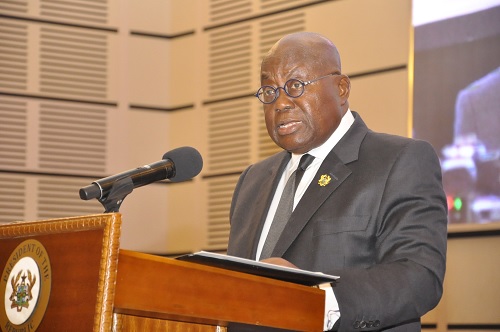Government is ready to partner with all stakeholders, especially the private sector and academia, to drive investment in research into the area of plastic waste management, President Nana Addo Dankwa Akufo-Addo has said.
Ghana has been selected as the second country globally and only country in Africa to partner Global Plastic Action Partnership (GPAP) and the World Economic Forum to implement the global plastic action partnership.
Speaking at the Ghana National Plastic Action Partnership (GNPAP) launch in Accra, he indicated that there is a call for comprehensively managing plastic to address current environmental challenges, while using it as a vehicle for sustainable development.
According to the president, the country seeks through this partnership to take a historic step forward in our environmental stewardship, our sustainable growth, and our vision for Ghana’s future.
The president also maintained that the menace of plastic pollution has become one of the most pressing challenges facing mankind today. In villages, towns and cities, plastic waste continues to destroy the beauty of surroundings and clog drainage systems, resulting in floods – some of which have caused the loss of numerous lives and properties in Ghana and other countries across the world.
Furthermore, he stated that in river deltas/oceans, the presence of plastic threatens the very survival of all aquatic life and biodiversity; indeed, day-to-day activities of the human race are being affected by this phenomenon that is in why confronting this challenge demands the active partnership and cooperation of all nations
To this end, he commended efforts by the private sector and other international agencies including the UNDP Ghana’s role in facilitating establishment of the waste recovery platform that seeks to provide a one-stop shop for waste recovery and waste management in the country.
The National Plastic Management Policy is a statement of commitment by the government of Ghana and Ministry of Environment, Science, Technology and Innovation (MESTI) to find and deploy sustainable strategies for the effective management of plastic.
The policy builds on broader development aimed to grow the economy, create jobs and protect the environment, including mitigation of climate change.
It also aims at enabling the natural development of a vibrant and market-driven domestic recycling industry, intended to result in an improved state of the environment and public health, reduced future pressure on Ghana’s natural resources, and eliminate the nation’s dependence on imported finished commodities.
The Minister of Environment, Science, Technology and Innovation, Prof. Kwabena Frimpong-Boateng, on his part indicated that when fully realised the plans outlined in the plastics management policy will unlock economic incentives for source separation, collection, processing and recycling of plastic waste into valuable resources, generating revenue estimated at four hundred million US dollars (US$400m) per year.
“We expect our partnership with GPAP to embrace other governmental entities and be driven by locally-based plastics systems experts. The Ghana NPAP must seek to develop deep insights into the systemic challenges relating to plastic production, consumption and disposal in the Ghanaian market, and to ensure a proper set of engagements among all the relevant stakeholders.”
NPAP must create a platform to unite all players within the plastic value-chain, set common objectives and help create linkages that drive innovation and create maximum impact, he noted.

In Ghana, over 3,000 tonnes of waste from plastic is generated across the country every day. This constitutes about 14 percent of the entire municipal solid waste accumulated in the country. Within the Accra Metropolitan Area, including the Accra-Tema coastline areas, 35.6 percent of the total waste is plastic.
Only 2-5 percent of waste from plastic is collected for recycling, and this is almost entirely performed by the informal sector.
The Head of Africa for World Economic Forum, Elsie Kanza, stated that Ghana has demonstrated clear leadership to combat waste pollution, and this arrangement represents an extraordinary platform for Africa to exchange ideas.
She also maintained that the initiative will deal with systemic issues on the state of the environment.
Source: B&FT Online





